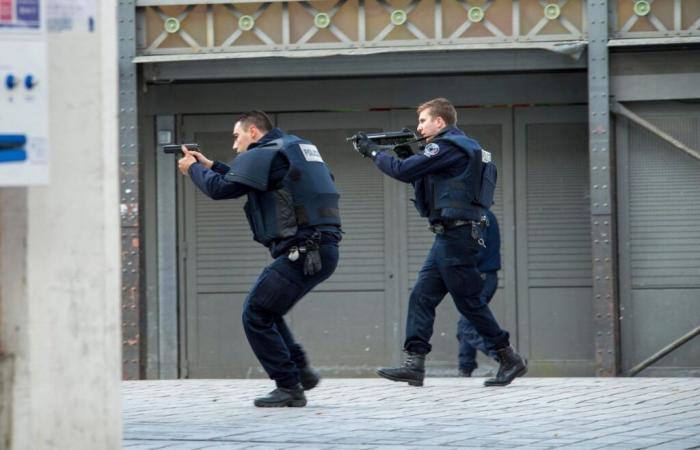Police officers during an anti-terrorist intervention in Saint-Denis, near Paris, November 18, 2015. STEVEN WASSENAAR / HANS LUCAS VIA EPISODE
Read later
Google News
Share
Facebook
Twitter
E-mail
Copy link
Send
Reading time: 3 min.
Free access
Decryption
Hard hit by terrorism in 2015, the French state adopted several measures to improve the fight against terrorism. Effective measures but which have since given rise to repressive diversions due to a lack of control.
On January 7, 2015, just ten years ago, the brothers Chérif and Saïd Kouachi entered the premises of “Charlie Hebdo” in Paris and murdered twelve people. This will be followed by the assassination of a municipal police officer from Montrouge and the hostage-taking of the Hyper Cacher store at Porte de Vincennes by Amedy Coulibaly. Three days which will tip France into the nightmare of terrorism which will continue with the attacks of November 13 (130 dead).
Also read
Series
2015 attacks: from “Charlie” to the Bataclan, a French trauma
Subscriber
Read later
In response, public authorities are working to provide additional weapons to law enforcement, intelligence services and justice. Laws are passed, debates are launched and above all, the state of emergency is activated for the first time since the Algerian war. Decisions which made it possible to improve the fight against terrorism, but which have since given rise to liberticidal diversions due to a lack of control.
Return to January 2015. The socialist government promulgated a law two months earlier strengthening the provisions relating to the fight against terrorism. François Hollande, then President of the Republic, renounced declaring a state of emergency. On the other hand, it accelerates the presentation of a text aimed at providing a legal framework for the activities of the intelligence services, which will be adopted on July 24. “It wasn’t perfect but it laid the foundations for intelligence oversight”explains Serge Slama, professor of public law at Grenoble-Alpes University.
A law that lays “the foundations for intelligence control”
While many practices take place outside of any control other than hierarchical, the new text provides a legal basis for intelligence actions: wiretapping, vehicle marking, sound systems in private places, capture of images and computer data, etc. now requires the authorization of the Prime Minister, after advice from an independent administrative authority. A right of appeal to the Council of State is also provided.
Also read
Decryption
What remains of the “Charlie” spirit?
Subscriber
Read later
“France is better armed todaywelcomed ten years later in an interview with “New Obs” Bernard Cazeneuve, then Minister of the Interior. Because we have significantly increased the resources of the internal security forces and intelligence services to face an unprecedented threat. » However, certain measures are considered repressive and contested by several associations, starting with the introduction of “IMSI-catchers”, imitators of relay antennas which make it possible to vacuum up telephone conversations en masse. Or the “black boxes” supposed to allow intelligence services to analyze large quantities of data retrieved from the internet. This last point was also called into question by the Court of Justice of the European Union in 2020.
The state of emergency, “exorbitant” and “misused” powers
The main change came on the evening of the November 2015 attacks, when François Hollande declared a state of emergency. An exceptional measure provided for by the law of April 1955, which offers numerous additional powers to public authorities: restriction of travel, ban on public meetings, house arrest, searches in any place, etc. Intrusive provisions justified by the emergency and regulated by law which authorizes them for only twelve days. “At this time, there are hundreds of deaths, we do not know if there will not be other attacks, so the use of the state of emergency seems justified to me”judge Serge Slama.
After this period, Parliament must decide. On November 20, 2015, he extended this exceptional regime for a period of three months, then renewed it five other times until… 1is November 2017. “From an operational point of view, it was no longer justifiedcriticizes the lawyer specializing in fundamental rights litigation. But from an electoral point of view, it was extremely complicated to get out of it. » Result: after announcing the imminent end of the state of emergency during his speech on July 14, François Hollande changed his mind following the attack in Nice a few hours later.
Also read
Interview
“We have entered a culture of suspicion”: ten years after “Charlie”, the public debate on poisoned Islam
Subscriber
Read later
The exit will finally arrive with the election of Emmanuel Macron, who had made it a campaign promise. “But the counterpart was to take the main measures of the state of emergency into common law”explains Serge Slama. On October 30, 2017, the law strengthening internal security and the fight against terrorism was promulgated and has since served as a framework law for the fight against terrorism. The difference? Until now exceptional, these measures can now be used at any time. “This opens a window of opportunity for the prefects or the Minister of the Interior to divert these somewhat exorbitant powers from their intended purpose. »
“We must be wary of side effects”
Therefore, the use of these measures is observed in situations far removed from their anti-terrorist objective: security perimeter during Emmanuel Macron's travels in order to escape the “breakouts”, attempt to dissolve the Earth Uprisings, away from the protesters, 1.2 million administrative investigations during the Paris Olympic Games (JO)… For Serge Slama, the opening ceremony of the Olympic Games even “allows you to see in one place several remnants of different states of emergency: protection perimeter, traffic restriction zone, house arrest of people deemed dangerous, use of systematic drones and QR codes…”
If the lawyer assures that it is normal to evolve intelligence techniques with regard to new terrorist threats, he warns of the lack of control and the “misused uses” tools. In August 2023, a Renaissance MP suggested the dissolution of La France insoumise, a political movement represented in the National Assembly… How far could this go? Time will tell. In the meantime, Serge Slama responds to Bernard Cazeneuve: “Yes, we are better armed and the basic means have reduced the number of attacks, but we must be wary of side effects. »






